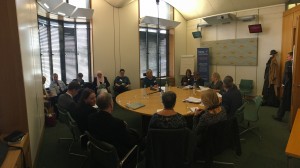At the start of the summer, the APPG for Education launched an inquiry in to how well British schools are preparing young people for their future careers. The APPG began this process by collecting written evidence from parents, teachers, employers and academics and has since arranged round-table evidence sessions focusing on three key areas: where the balance should lie between teaching knowledge-centric education and soft skills; the quality and effectiveness of current careers advice and guidance; and finally, a discussion of whether schools should prioritise the study of STEM subjects.
On the 13th October, the first of these round-table discussions took place in Parliament. The session focused on the aforementioned balance between subject knowledge and softer skills and the debate was chaired by Danny Kinahan MP, Chair of the APPG for Education. Participants ranged from teachers and academics to parents and employers, and included: the Association of Teachers and Lecturers, the British Council, the Institute of Education, Capita, the Institute of Customer Service, National Citizen Service Trust, the National Literacy Trust and the Parents’ Union, several universities and the Times Educational Supplement.
The debate concentrated on three central topics: whether there is a need for better soft skills education; who should be responsible for teaching those skills; and some examples of best practice that others could learn from.
There was lively debate throughout but perhaps the most vociferous discussions were centred on how the teaching of soft skills should be delivered. Some participants emphasised the need for soft skills to be taught in a subtle way as part of wider academic subject education– stressing that soft skills, such as communication and critical thinking, would naturally be enhanced through knowledge based teaching. Others felt that that students do not enjoy the teaching of soft skills in the abstract and it can even negatively affect performance.
However, many members of the roundtable countered with the point that the UK’s economy is dominated by the service industry and so soft skills are becoming more important as interaction with others supplants technical knowledge as the key skill for work.
Others summarised the situation by claiming that hard skills are becoming softer whilst soft skills become harder – demonstrating that a blended approach to teaching knowledge and skills may be the best approach moving forward.
Other participants highlighted that soft skills are hard to measure and the testing of such skills cannot be too prescriptive. The teaching of knowledge through pre-packaged gobbets of information was to the detriment of students’ abilities to garner soft skills. Therefore, for the success of the blended teaching approach, it seems that overly prescriptive teaching methods must be forgone.

